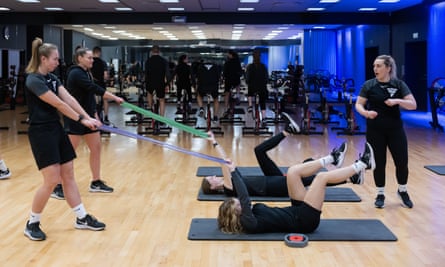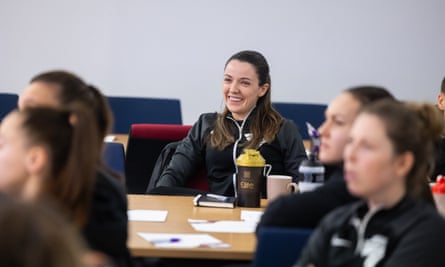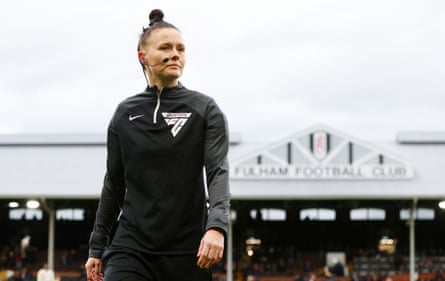‘I
“I understand now,” I exclaim, perhaps a bit too eagerly, as Bibi Steinhaus-Webb, the leader of women’s refereeing in England, takes a seat across from me. I realize that I forgot to hit record for our interview and impulsively add, “I finally see the appeal of being a referee.”
Prior to attending the PGMOL’s select group women’s professional game training camp, I couldn’t understand why someone would choose to become a referee. It seemed like a role where every thought and decision would be scrutinized and criticized, with little praise.
I often wonder why anyone would subject themselves to such treatment when I hear about yet another incident of a referee being mistreated, whether at a grassroots or professional level. I recognize that being a referee is a challenging role, requiring immense dedication and the ability to handle criticism. However, I was unfamiliar with the intricacies of the job and did not appreciate its complexity. It’s like playing a combination of chess and boxing simultaneously, known as chess boxing, where players switch between rounds of each activity.
During the training camp, while attending a session on the new rules of the International Football Association Board (IFAB) regarding deliberate or deflected touches by defending players and determining offside positions for attacking players, I had an unusual idea: despite my lack of fitness and skill, I was eager to try it out. However, I quickly dismissed the thought and refocused on the session.
The IFAB regulation appears to lack widespread popularity, but the current discussion revolves around its most effective implementation. We view several video clips individually, pausing each one to analyze whether the ball was intentionally contacted or not. Despite multiple discussions among the tables, a consensus cannot be reached due to the difficulty of determining the player’s intent.
In a short amount of time, it becomes clear that these officials must quickly address and determine the player’s intention in these incidents, without the luxury of extended replay reviews in this conference room. Can I definitively determine if there was intent? No.
Steinhaus-Webb emphasizes the importance of mental preparedness for referees, even after 90 minutes of intense physical activity and a heart rate of 180 beats per minute. Comparing it to running a marathon, she explains that it would be unreasonable to expect a runner to perform a difficult mathematical task as they are crossing the finish line. Similarly, referees must train rigorously to maintain mental acuity in order to make accurate decisions.

It appears that match officials must follow a similar training routine to Taylor Swift’s before her Eras Tour. She would run on the treadmill for the entire three-hour set while singing the songs and adjusting her speed to match the pace of each song. “That’s precisely it,” confirms Steinhaus-Webb. “It’s a significant aspect of their responsibilities: physical and mental preparation, as well as technical readiness.”
Throughout the year, PGMOL will hold matches and tournaments in order to simulate a real game environment as much as possible. However, according to Steinhaus-Webb, it is impossible to fully recreate the intense pressure and high level of players seen in an elite level match like Arsenal v Chelsea at the Emirates. She compares this process to learning how to drive, where repetition of processes eventually leads to a state where you no longer have to think about them while driving. This is the desired state for referees to reach in their decision-making.
I inquired with referee Kirsty Dowle about how she prepares for rule changes, after she received applause from fans and was commended for her performance in the men’s National League match between Southend United and Oxford City in October.
According to her, while teams have the chance to practice and improve every day, we do not. However, on weekends like this, we have the opportunity to review footage and discuss with each other. I can analyze my own games and clips. Even though I am not physically performing, I am constantly processing and preparing so that when I step onto the field, it feels like I have already done it countless times before.
Dowle reflects on the surprise applause at Southend, stating that he initially didn’t realize it was for him and assumed it was for the players. He also mentions that the club had a successful day with a 2-0 win and the sale of the club taking place, and he doesn’t believe he did anything extraordinary to warrant the ovation. He believes it was just a fortunate moment for the club.

Dowle has been fortunate enough to quit her job and dedicate herself fully to refereeing, but not all referees have that opportunity. Currently, only 20% (15 out of 75) of the officials in women’s soccer have contracts that allow them to focus solely on refereeing. In the Women’s Super League, that number is almost doubled, according to Steinhaus-Webb. She acknowledges that when they first started, the numbers were much lower, but now, with half of the referees having contracts, they are making great progress and are on track to reach an even better state in the future.
Those who cannot work full-time are still maintaining extremely high levels of professionalism, thanks to a staffing team that has doubled in size since Steinhaus-Webb took over three years ago. For Dowle, giving up other work has had a significant impact and has made her enjoy refereeing even more. She was concerned that relying on refereeing as her main source of income would increase the pressure, but having enough time to rest, prepare meals, watch game footage, and communicate with coaches has been beneficial.
“Skip over the advertisement for the newsletter.”
after newsletter promotion
Steinhaus-Webb and her colleagues are making efforts to safeguard individuals who are unable to commit full-time. According to Lauren Whiteman, a PE teacher and assistant referee in the women’s Championship who is relatively new to the women’s select group, the extra assistance has been invaluable. She admits, “I have no complaints about the support I have received. In the past, I have gone through my journey with some support, but not necessarily with a coach or someone I can consult with and discuss things with. This season has been completely different.”

This year, Whiteman has utilized communication for the first time, managed the lines during a televised game, and was selected for the Manchester City versus Liverpool game in the Continental Cup. “I have to admit, I was close to dropping my phone,” recalls Whiteman when she received the call informing her that she would be working the match between the two WSL teams. “It was one of the most significant fixtures you could hope for. I was relieved that it went smoothly. When you’re given an opportunity like that, you want to make the most of it.”
Emily Carney, a fellow assistant referee, has been a beneficiary of the development program introduced in 2022, which provides officials with the chance to advance in their careers. She describes the opportunity as highly fulfilling. Carney admits to not being a fan of referees when she was a young player, and her mother even told her she was “unpleasant” towards them. However, it was her mother who encouraged her to take the course to gain a better understanding of the rules. Carney’s progress has been swift, and she had the chance to travel to games with international assistants Rebecca Welch and Sian Massey-Ellis early on, learning from their expertise.
During this season, she has been officiating as a linesman for several men’s EFL matches. She explains, “When you transition, you feel a sense of responsibility to represent female officials and their aspirations.”
In December, Welch was given the opportunity to officiate the Premier League game between Fulham and Burnley as a recognition of her involvement with the development group. Steinhaus-Webb recalls feeling moved while watching Welch in that match, wishing for her success without any complications.
Steinhaus-Webb is proud to announce that five new match officials from England have been added to the Fifa International List for 2024. This includes four members of the women’s select group: Georgia Ball, Nicoleta Bria, Sophie Dennington, and Emily Heaslip. With this addition, the list now boasts a total of 13 women from England.
During a session on non-verbal communication, Steinhaus-Webb demonstrates a power pose by placing her hands on her hips. Shortly after, she instructs the rest of the group to stand up and mimic various hand positions and poses while discussing their non-verbal meanings. Her approach is playful and self-aware, creating a relaxed and enjoyable atmosphere – a welcome change from the often tense environment of matchdays.
“I absolutely adore being a referee. Choosing to pursue this career has been the greatest decision of my life,” says Steinhaus-Webb. “I understand that it may be challenging for others to comprehend, which is why I want you to see it through my perspective. I want to share my passion and why I fell in love with it.”
Source: theguardian.com


